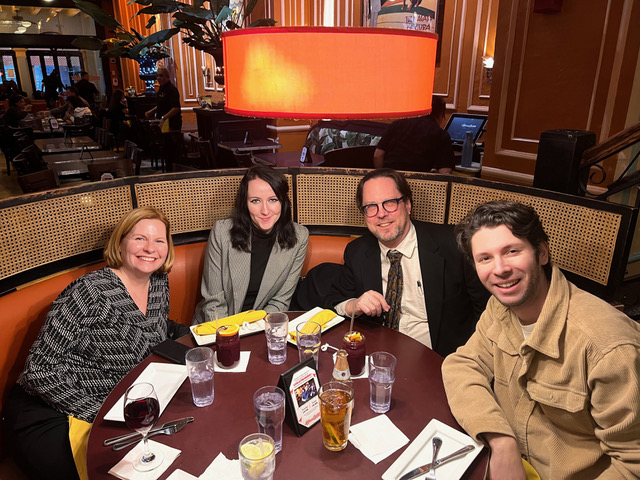Editor’s Note: Today’s post is by John W. Warren, Tina Donnelly, Joshua Luke Johnson, and Maria Sviridova Chandis. John is Director and Associate Professor, MPS in Publishing, George Washington University. Tina is an Assistant Managing Editor at Penguin Random House Audio. Joshua is the Managing Editor for the GW Journal of Ethics in Publishing. Maria is an MPS in Publishing candidate, George Washington University.
Digital Book World (DBW) returned to Manhattan, January 16-18, 2023, like a phoenix rising from the ashes, with two and a half days of programming on publishing startups, innovations in AI, NFTs, audiobooks and podcasting, and other emerging and reemergent trends in publishing. Originally introduced in NYC in 2009 by Mike Shatzkin and Lorraine Shanley, the Digital Book World conference was acquired by F+W Media, and subsequently sold to Score Publishing in 2017, whose CEO Bradley Metrock also runs the conversational AI and voice technology company Project Voice.
In the 2000s and early 2010s, especially after Amazon and Apple introduced the Kindle and iPhone, respectively, in 2007, a flurry of conferences and seminars on digital publishing and publishing innovation graced New York City, Chicago, Los Angeles, and Washington, DC, as well as some publishing hubs overseas. Digital Book World, along with O’Reilly’s Tools of Change, Book Expo America (a once illustrious trade book publishing conference), among others, were venues where those innovating in book and journal publishing can share insights and best practices.
It was great to be back and speak again at DBW. Familiar names from the first golden age of digital publishing were present, as well as plenty of fresh faces and new, diverse perspectives. The impact of those earlier conferences was not merely from the sessions themselves, but the connections, relationships, and strategic partnerships enabled and established by these meetings.
I fear the newer generation has been missing out on these conversations and connections centered around innovation in digital publishing, especially, of course, during the pandemic but even for several years prior. This is more the case in trade publishing, as SSP’s and other annual meetings in scholarly publishing continue to explore digital transformation.
Three students in the Master of Professional Studies in Publishing program at George Washington University — Tina Donnelly, Joshua Luke Johnson, and Maria Sviridova — were able to attend the entire conference and it was a riveting experience for them. Here, they share perspectives on attending DBW as a young professional, the trends and companies that stood out to them, and their relevance for scholarly publishers and professionals.

Tina Donnelly, MPS in Publishing (2022); Assistant Managing Editor, Penguin Random House
DeepZen: An especially interesting presentation was that of DeepZen, a digital content creation company that manufactures professional narration using AI technologies. This service has the potential to significantly shape several sectors of publishing, most notably audiobooks, as well as other audio fields such as podcasts and advertising.
Essentially, DeepZen can produce completely artificial voice acting by cloning recorded words from a digital sound library to construct narration. They offer several languages and even several accents to suit a range of different projects, achieving an authentic tone and lifelike cadence. This is useful in that DeepZen turns text into audio content without the need for costly recording studios. They sample voice actors and use AI to narrate content. The original voice artists are compensated for their work through a royalty (the amount was unspecified) and the client receives a professional narration at a lower cost than a more traditional recording session would allow.
At first glance, this may not seem entirely suitable for audiobooks, which are meant to bring a story to life through different inflections, affectations, and vocal idiosyncrasies, all of which are noticeably absent from DeepZen’s AI work. However, Victoria Petrova, the Sales and Customer Success Manager representing DeepZen at the NYC Digital Book World, argues that not all audiobooks need such a production. Some audiobooks, such as academic or scholarly texts, don’t require the skill and talent of a professional voice actor to successfully relay the information. DeepZen reasons that digitally created narration could curb publishers’ production costs on audiobooks that do not otherwise demand as much artistic representation.
While this may seem unsettling to the voice actor community, there is no doubt that AI narration will inevitably come to play some part in the publishing sphere, big or small. These technologies also have the potential to expand accessibility by increasing audio content from scholarly publications.
Fable: Another point of interest was that of Fable, a startup online community centered around promoting, discovering, and sharing books through social media.
Founder and CEO Padmasree Warrior has embarked on the truly admirable endeavor of uniting the world through the power of stories, and one only needs to visit Fable’s website to see how eager her user base is to connect. Unifying #BookTok — which became TikTok’s most popular community in 2022 — online book clubs, and blogs, Fable has joined together an entire online community through reading, a traditionally solitary activity. Users can follow book events, read blogs, join a plethora of online book clubs, and shop for books, all on the same interactive platform. Fable is an impressive testament to the passion of readers, opening an array of new ways for them to share their favorite books through social media.
Additionally, Fable is committed to fostering a diverse community and promoting underrepresented voices in its company. There is not only a diversity of authors and readers active on the site but also a diversity of stories. Fable excels in creating an online community focused on the unifying power of stories, the perfect realization of the ever-enduring advice from Lemony Snicket, which Fable proudly displays on its website: “Never trust anyone who has not brought a book with them.”
Warrior mentioned that 72 percent of Gen-Z readers on Fable report reading more than five hours per week. Their goal is to expand on factors driving the #BookTok phenomena—highlighting a book’s emotional journey, expanding the reading experience, and sparking FOMO for a beloved book — while countering the negative effects of social media, the ephemeral nature of posts, and enabling a social, not solitary, reading experience, through shared annotations, reading groups, and book clubs.
While most current groups and users of Fable are Gen-Z and focused on popular fiction and non-fiction, the lessons for scholarly publishers are clear: it’s essential to create a community around your content, and people are eager for a social platform to connect through books.
Joshua Luke Johnson, MPS in Publishing candidate; managing editor, GW Journal of Ethics in Publishing
Book.io: Founded and led by entrepreneur Joshua Stone, Book.io, has a vision to take the publishing industry onto the blockchain. Publishing, in particular scholarly publishing, has a complicated history with technological innovation, often choosing precedent over revolution for fear of ushering unnecessary risk into a functioning system. Even at the Digital Book World conference, which offered a respectable lineup of progressive, forward-thinking companies within the publishing industry, I listened as those around me discussed in low voices their skepticism of “new-fangled technology”.
While many are understandably wary of cryptocurrency, NFTs, and the blockchain, especially after the recent market downturn, Stone presented Book.io as an accessible catalyst to carry publishers into a postmodern technological ecosystem. Through limited edition covers minted on the Cardano blockchain and released in tandem with print runs, Book.io aims to revolutionize the modern marketing of books and printed content, bringing the industry parallel to the highly valued and ubiquitous industry of collectibles and rare media. The company offers comprehensive digital rights management (DRMs) that provides consumers full ownership of their content through a digital wallet locked with a unique key, similar to NFTs. Crucially, the publisher or creator also maintains a stake using smart contracts that allow publishers and creators to gain from subsequent sales and increases in value. Unlike ebook purchases, where the consumer has a license but neither ownership nor resale rights to the product itself, Book.io’s model makes every purchase an investment for the buyer as well as the potential, at least, to further reward the publisher and creator.
While Stone is currently marketing Book.io’s technology largely to a trade audience, the blockchain offers an opportunity to solve long-standing problems of IP and authorship. This technology in scholarly publishing provides opportunities for infallible citations and digital watermarks of verified, content in digital formats.
Maria Sviridova Chandis, MPS in Publishing candidate, George Washington University
I felt fortunate to be among the attendees at the Digital Book World conference, as a student representative from George Washington University’s MPS in Publishing program. My first experience at DBW was both exciting and invaluable as it provided me with a wealth of knowledge, plus inspiration for my additional learning about the US publishing industry. Most of my career has been spent internationally on the production side of publishing, so it was an incredible opportunity to listen to speakers from different companies, sectors, roles, and perspectives, while networking with other professionals and experts in the field and exploring the industry’s new and progressive trends.
Scribd: A highlight was the presentation by Andrew Weinstein, VP of Content Acquisition at Scribd, a company that focuses on the e-reading market. Scribd provides a subscription-based reading service that allows users to access a wide variety of e-books, audiobooks, documents, and podcasts. A key feature is its personalized recommendations, generated based on a user’s reading history and preferences: “Scribd’s vision is to inspire the world through stories and knowledge.” This helps users discover new books, scholarly journals, articles, and authors of interest.
The service’s uniqueness is keeping the market growing and diversified. While a subscription-based model is an anathema to many of the largest trade publishers, Weinstein emphasized Scribd’s goal was “to expand and not cannibalize the market” for books, journals, magazines, and other content. This unique vision was intriguing because by offering a specific value proposition and catering to a targeted segment of the market, it coexists with similar platforms. Furthermore, it provides a set of tools for authors and publishers to upload and distribute their content on the platform. Scribd works with trade, scholarly, and other publishers as well as authors and content creators across the spectrum from unknown to well-known.
As a new attendee to DBW and a newcomer to digital publishing in the United States, I was truly impressed that the company has built a platform with 80 million users alongside the existing publishing ecosystem. Scribd seems to have been able to create a strong community of partners, opening potential new prospects for everyone who is on the platform and expanding the publishing industry. Certainly, scholarly publishers are familiar with subscription-based models, though few have pursued an active strategy to reach a general audience through an all-in-one, monthly subscription model.
Discussion
1 Thought on "Guest Post — Entering a New Age of Digital Publishing: Dispatch from Digital Book World 2023"
Given Tina Donnelly’s, Joshua Luke Johnson’s and Maria Sviridova Chandis’ reports on Digital Book World (DBW) 2023, the future, re the interface of bibliophilism with technology, sounds very exciting!



